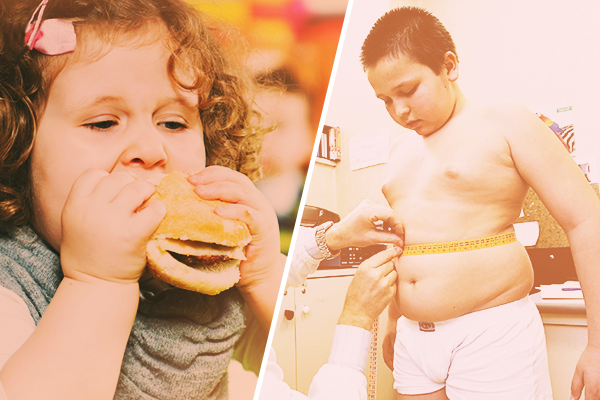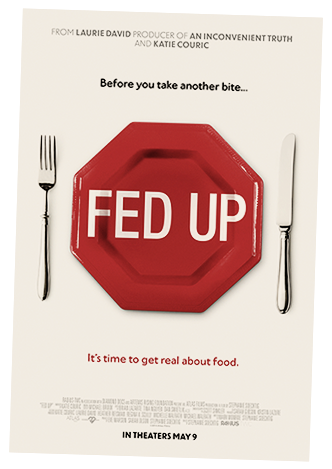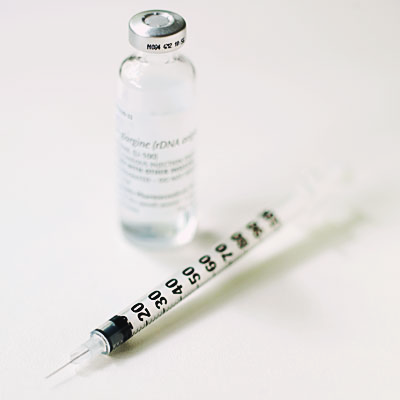An alarming documentary I watched last weekend, called Fed Up, prompted me to text my daughter, who has an 18-month old son:
“Don’t ever give Primo any cold cereals or other supermarket foods that have tons of sugar, even if the boxes say low fat or no fat. It’s scary what’s happening with children’s health in America because the food industry is producing such crap.”


I challenge anyone to watch this 95-minute documentary without having a similar reaction. Even if you’re smart enough to keep yourself and your family far, far away from processed foods, you’ll be shocked to learn just how much they’ve contributed to the snowballing childhood obesity epidemic, the likes of which the world has never before seen.
First consider these two ridiculous, well-known facts:
- American auto companies freely manufacture (and sometimes even surreptitiously sell) defective cars that can kill us
- American tobacco companies knowingly produce cancer-causing cigarettes
Here’s a third equally ridiculous fact, that isn’t as well known; as a matter of fact, it’s one of America’s best-kept, dirty-little secrets: The mammoth American food companies knowingly make cereals, cookies, frozen breakfasts, lunches and dinners—hundreds of thousands of processed foods—that are creating a “tsunami of sugar” sweeping up our children and putting them at precipitously high risks for developing cancer, stroke, diabetes and heart disease.
And nothing is stopping these companies from continuing this despicable practice
Not Michelle Obama (although she’s tried with her Let’s Move campaign). Not our schools, 80 percent of which have deals with companies, including Coke and Pepsi, to serve junk food and beverages to our children and grandchildren. Not parents, who succumb to the lures of food marketing, on TV, on the internet and  around practically every corner they turn. And certainly not our children.
around practically every corner they turn. And certainly not our children.
Yep, that’s right. One in five children today is obese, compared to one in 20 in the past. Obesity isn’t just unattractive and sloppy. It leads to chronic illness. Imagine an eight-year-old giving himself insulin shots. You don’t have to imagine. It’s happening. It really is. Once limited to adults, Type 2 diabetes has become a childhood disease.
The amount of added sugar in the 600,000 processed foods currently manufactured in America is horrifying. Sugar isn’t just in cookies and desserts; 80 percent of our processed foods have added sugar. Our kids are becoming sugar addicts. The American Heart Association recommends a daily sugar intake for women of 6 to 9 teaspoons, but our daily intake is actually 41 teaspoons.
If we keep traveling down this sugar-paved road, it’s estimated that 95 percent of all Americans will be obese in the next two decades.
The seeds of the epidemic actually were planted in 1977, after a government committee on nutrition and human needs heard expert testimony that obesity was the #1 form of malnutrition in the US, caused by a diet overly rich in saturated fats, rich in sugar, rich in fatty meats and rich in cholesterol. When the committee report recommended the creation of dietary “goals” for Americans—that we reduce our intake of fat-rich, caloric food—the egg, dairy, beef and sugar associations united, rejected it and demanded a rewrite.
If Americans reduced their intake of fat-rich, caloric food, that would translate into less business, the food industry correctly reasoned. Can’t have that, manufacturers thought, so they started getting creative, and devious:  They re-engineered their food with less fat and fewer calories, but began dumping in more sugar to make it taste better. Otherwise, the food would have tasted like cardboard. That’s when the marketing gurus stepped in and designed labels that made bold statements, such as: “Now with half the fat and one-third fewer calories.” What the labels didn’t say was that the re-engineered food contained twice the sugar. The upshot? Americans doubled their daily intake of sugar from 1977 to 2000.
They re-engineered their food with less fat and fewer calories, but began dumping in more sugar to make it taste better. Otherwise, the food would have tasted like cardboard. That’s when the marketing gurus stepped in and designed labels that made bold statements, such as: “Now with half the fat and one-third fewer calories.” What the labels didn’t say was that the re-engineered food contained twice the sugar. The upshot? Americans doubled their daily intake of sugar from 1977 to 2000.
Remember when the heads of the tobacco companies “lied through their teeth” about the dangers of smoking, the film asks? Everyone watching the lineup of tobacco execs seated before Congress knew they were calculating clowns, but we let them get away with it. Until we didn’t. And when the government, media and the public finally took on the tobacco companies, in the mid 90s, changes were swift and effective. Smoking ads were banned on TV; smoking was banned in planes, in the workplace, in restaurants. Labels on cigarette packs were honest. The fact is, we should ban smoking entirely, but the tobacco lobby is too strong, so we’re settling for second best. The good news is that half as many high school students are smoking now than they did 20 years ago.
Well, my dear FOFriends, the documentary claims that the food companies have been lying through their teeth for the last 30 plus years about the damage that sugar is causing to the health and well being of our children. And we will have to “demonize the food industry, like we demonized the tobacco industry,” if we are going to cure obesity, the documentary emphatically states.
I’m ready. Are you?
Here are 19 other crucial facts and statistics I gleaned from Fed Up about the obesity epidemic and the effect of sugar on our children’s (and, of course, our) health.
1. More people will die from the effects of obesity than starvation.
2. People erroneously believe that they’re “eating healthy” if they consume foods with less fat and fewer calories.
3. Fitness club memberships in the United States doubled from 1980-2000, while our obesity rate also doubled. Two out of every three Americans are now obese or overweight. Something doesn’t measure up between these two facts.

4. Sugar is more addictive than cocaine. That’s a biological fact. If the food industry gets you to start your baby on high sugar foods, they’ll become addictive. The earlier you introduce these foods to kids, the quicker they’ll come to your side.
5. Junk food is still junk food, even if it’s less junky than before.
6. A child would have to exercise for 80 minutes to burn off one 20-ounce Coke.
7. We’re not going to exercise our way out of obesity. We’ve been told, for decades, that we need “to eat less and exercise more,” that it’s “our fault” that we’re gaining weight. In fact, the food industry is a huge part of the problem, because it spreads “half truths and stretches the truth” about the food we’re eating.
8.Sugar can only be processed in the liver. When the liver is pushed to process too much sugar, the pancreas comes to the rescue and produces excess amounts of insulin, a hormone needed for proper control of blood sugar. Insulin helps move sugar from your blood into most of your body’s cells, where sugar is used for energy. In patients with type 2 diabetes, the pancreas does not make enough insulin, and/or the insulin that the pancreas makes does not work the way that it should. As a result, sugar in the blood cannot enter most cells and the cells are unable to use this sugar for energy. Consequently, the excess sugar is turned into fat.  High blood sugar levels can cause serious long-term health problems.
High blood sugar levels can cause serious long-term health problems.
9. High levels of insulin also block the brain from getting the signal that you feel full.
10. When we consume sugar in fruit, we also are getting fiber, which offsets the negative effects of sugar. Therefore, a calorie of pure sugar is not the same as a calorie of sugar in fruit.
11. Artificial sweeteners make us hungrier.
12. Sugar hides behind many names on nutrition labels, including maltose, high fructose corn syrup, sucrose, dextrose and lactose. Too much sugar in any form is dangerous.
13. Coke sponsored a study that said soft drinks have nothing to do with obesity. Pretty funny, eh? People are getting wise to industry-funded studies.
14. “Value meal” messages are embedded in our culture. They may be cheap. They’re also pretty much junk.
15. When the World Health Organization reported that sugar is the major cause of chronic metabolic disease, President Bush threatened it that he’d withdraw funds if it published the report.  He didn’t want to be too tough on the food industry. Our government has absolutely been complacent about this issue. Like the tobacco industry, the sugar industry is just too powerful.
He didn’t want to be too tough on the food industry. Our government has absolutely been complacent about this issue. Like the tobacco industry, the sugar industry is just too powerful.
16. When the food industry heard Michelle Obama’s Let’s Move plan, they reacted in terror and volunteered to help, just so they could manipulate the conversation from real food to what they can do to processed food. An industry under the threat of government intervention will promise to police itself.
17. We’re paying a very dear price to let the food industry relentlessly market junk food to our children through TV ads, by giving away toys and using their favorite cartoons. When kids watched food commercials, they ate 45 percent more than when they watched non-food commercials. Children’s exposure to junk food advertising, including online ads, increased 60 percent from 2008 to 2010.

18. Many industries, besides food, profit from unhealthy Americans, including the exercise industry and the insurance industry.
19. Weight-loss surgeries have increased five fold since 2001.


0 Responses to “You’ll Be Fed Up In 95 Minutes!”
Patrice Roussell says:
It is just awful what the sugar content is in most foods on the market. I try to buy as much fresh foods and cook them myself as I can.
Laurie says:
This article is well-meaning, but misleading. No disputing the fact that Americans, and our children, are heavier than ever before – but the idea that sugar calories are different than fat calories in how they affect our weight gain is totally incorrect. A calorie is a calorie. Also, instead of demonizing the American food companies that make the overall incredibly nutritious, SAFE, food that we get to buy with an amazingly SMALL part of our disposable income-lets instead look at our individual responsibility to eat healthy: reasonably-sized serving portions of foods that are balanced in their nutrient content. And let’s not forget our responsibility to BE ACTIVE – KEEP OUR BODIES MOVING and FIT. The lifestyle that the average American leads is sad in the sheer amount of UNBALANCE: Caloric intake / caloric expenditure. Let’s put the responsibility where it belongs.
Geri Brin says:
Hi Laurie,
I would suggest you see the documentary or read the article a little more carefully. There is not a single misleading statement in either.
FIRST, all sugar calories ARE NOT the same, which the article and the documentary explain.
SECOND, NO WHERE does the article say that sugar calories are the same as fat calories.
THIRD, 80 percent of the 600,000 processed foods on our shelves have sugar added. They may be tasty and cheap, but they sure aren’t SAFE or nutritious. Unless you think diabetes, stroke and heart disease are SAFE.
FOURTH, of course we all have the responsibility to eat healthily, just as we have the responsibility to drive safely.
But ,just as the auto companies have the responsibility to produce cars without known defects (to help us be safe), so do the food companies have the responsibility to produce foods without “defects.” ADDING SUGAR TO FOOD SO IT TASTES GOOD isn’t responsible. It’s, in fact, devious, because NO WHERE on food labels do we see a PERCENT OF DAILY VALUES next to the word sugar. That’s because the percent would be through the roof and food companies don’t want you or me to see that.
Nicotine is addictive. Cocaine is additive. And sugar is addictive (more than cocaine). So your concept of eating reasonably-sized servings that are balanced in their nutrient content may look fine and dandy on paper, but it simply doesn’t work for millions of people. That’s like telling a smoker: You really should cut down on your smoking. It’s going to kill you.
The food companies MUST DO SOMETHING, even if it’s putting warning labels on every single package of food with an ungodly amount of added sugar.
FIFTH: Of course, it’s our responsibility to be active. And yes, the lifestyle of the average American is unbalanced. But you’re dead wrong about the concept of caloric intake/caloric expenditure. People consuming masses of sugar each and every day (especially kids) would have to spend hours exercising to burn off part of it. So while lack of exercise certainly contributes to our national obesity epidemic, the sugar excess is a far greater demon. And most sugar addicts who are obese don’t have the impetus to get off the couch to exercise.
Besides, you can’t just tell someone who is 50, 100 pounds overweight AND ADDICTED TO SUGAR “Gee, Sally, you really should exercise more and stop eating all those cookies.” If only it were that simplistic.
SIXTH: It doesn’t cost more to eat healthy. It just takes more time to prepare and cook REAL FOOD than to buy and pop a package of crappy, unhealthy processed food into the microwave. And why steam some zucchini when you can shove a TV dinner into your mouth in minutes?
I welcome comments when people disagree with opinions. You’re disagreeing with facts and science.
Best,
Geri Brin